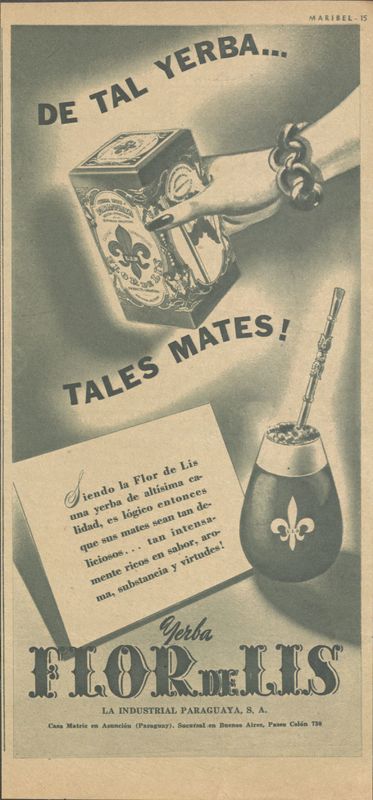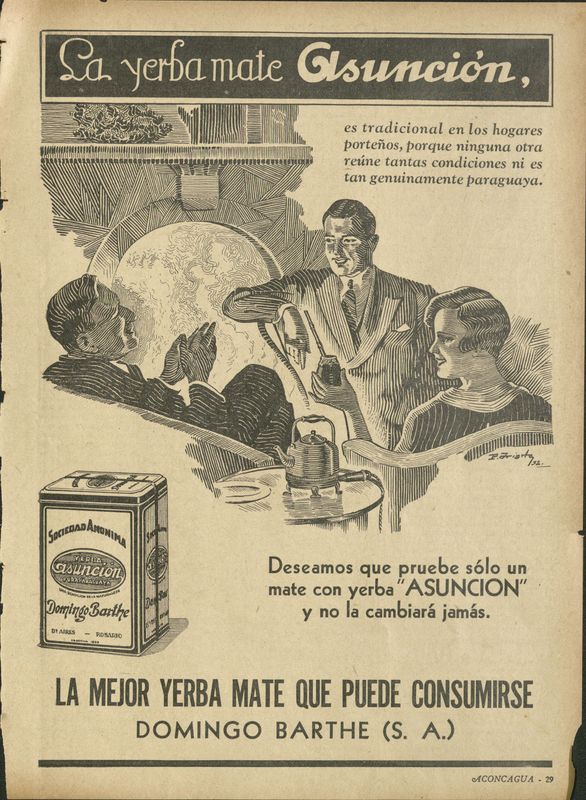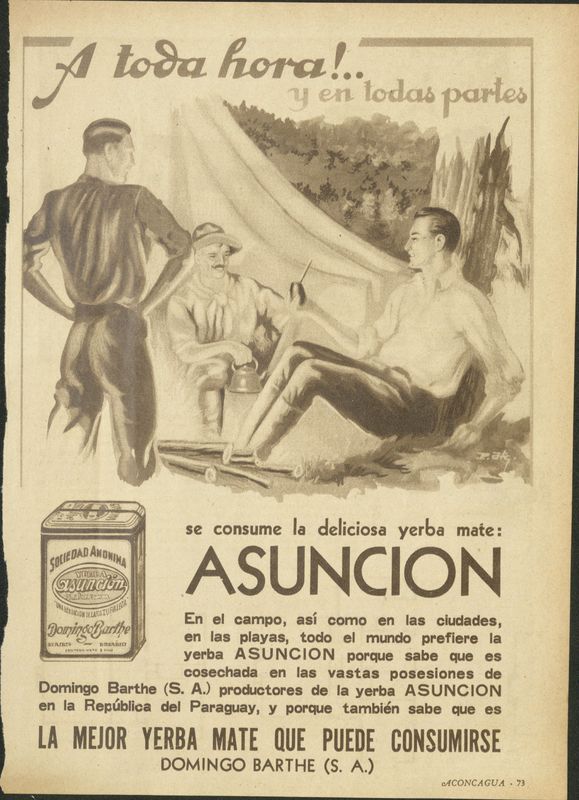Paraguayan Yerba Mate Advertisements of the 1930s
During the 1930s, many Paraguayan yerba mate advertisements aimed at Argentine consumers contained little acknowledgement of Paraguayan production or of the Guaraní heritage of the commodity. Due to the nations' historical conflicts and the erasure and absence of indigenous cultures in Argentina's idealized national self-image, the lack of specifically Paraguayan and, especially, Guaraní imagery and wording is not surprising. Instead, many brands opted to utilize images and wording that emphasized the class and quality associated with their specific yerba mate, at times even appealing to Argentine cultural identity. According to cultural anthropologist Christine Folch, Paraguayan yerba was generally viewed as being "higher-quality" than Argentine yerba (Folch, 16). With Paraguayan yerba directly competing with Argentine yerba, Paraguayan quality became a prime selling point for Paraguayan yerba mate companies in the Argentine market. This was especially in the 1930s as Argentina was producing massive amounts of lesser-quality yerba, being the largest yerba-producing nation in the world (Folch, 16). In Paraguayan advertisements aimed at Argentines in the 1930s, Paraguay was often only mentioned as a place of origin which also functioned as a sign of the product's quality, instead mainly associating the products with more Argentine or class-based images.
This image on the left, published in Argentine magazine Maribel in the 1930s, is an advertisement for Flor de Lis brand yerba mate. As the text at the bottom of the advertisement indicates, this is a Paraguayan brand of mate based in Asunción, Paraguay and also operating in Buenos Aires. Aimed at Argentine consumers, probably primarily female, the creators associated their brand of mate with two images: high class women and the symbol of the fleur-de-lis.
The woman’s hand, distinctively white and featuring jewelry and painted nails, connotes the woman’s social status and, by extension, the quality and desirability of the yerba she is holding. By associating Flor de Lis brand yerba mate with such a woman, the creator would hope that the average Argentine consumer would come to associate Flor de Lis with class and status, making the product itself more desirable and encouraging conspicuous consumption.
Similarly, the fleur-de-lis also serves to legitimize and signify the product’s quality and class association. The fleur-de-lis, for which the brand is named, was and still is a symbol typically identified with France and French identity, having been the national symbol of the French monarchy (Biddiscombe, 122). In this sense, the symbol of the fleur-de-lis forges a relation between the yerba mate and an imagined European heritage.
Though it employed an upper class, light-skinned woman and a French symbol in the fleur-de-lis to identify and differentiate itself, the Flor de Lis brand was Paraguayan. Yet, in order to market itself to Argentine consumers, it chose to use these indicators of product quality and heritage, rather than Paraguayan or Guaraní heritage. Without the identifying “La Industrial Paraguaya” at the bottom of the image, one would be hard-pressed to know at a glance where this product was produced.
This next image on the right is an advertisement for Asunción brand yerba mate from the Paraguayan Domingo Barthe company that was featured in the Argentine periodical Revista Aconagua in June 1932. This advertisement, aimed at Argentine consumers, features images with class connotations and wording meant to indicate the Argentine tradition associated with the brand and the quality of the product.
The item features two well-dressed and upper class men and a pale-skinned, high class woman with a stylish haircut enjoying and passing around Asunción brand yerba mate in front of a fire. Because the description at the top proclaims that Asunción yerba is "tradicional en los hogares porteños" or "traditional in the homes of Buenos Aires [the capital of Argentina]," one can safely interpret that these are, in fact, Argentine consumers of the product. Given that Argentine elites of the time generally promoted the ideas of Argentina as an immigrant nation of white descent, whitening both their history and their own self-representations, the skin color and look of these people cannot be ignored (Kaminski, 104). It is also worth noting the European-looking garments, especially the suit of the man in the middle, which looks like it could be from perhaps Italy or the United Kingdom. The creators probably sought to appeal to their Argentina-based consumers by associating the brand with these wealthy Argentine individuals, assuring people of its quality as well as its place within Argentine high society. This was probably aimed towards Argentine elites as well as the general public that, upon seeing Asunción brand yerba associated with such high class, fair-skinned, wealthy model citizens, would be more inclined to mentally link the product with both high quality as well as these Argentine national visual characters.
Similar to the imagery, the wording within this advertisement is meant to make the product attractive to Argentine consumers. It does this firstly through declaring that it is traditional in the capital of Buenos Aires and, therefore, part of Argentine culture, present in the very heart of the country and nation. Next, according to the creators of this advertisement, the product is traditional "porque ninguna otra reúne tantas condiciones ni es tan genuinamente paraguaya" or "because no other [brand of yerba] meets so many conditions nor is as genuinely Paraguayan." This statement assures the quality of the product compared to its competitors, whose products lack quality and are also not as Paraguayan, further indicating their lack of quality. While it would appear that this statement affirms some kind of Paraguayan agency in this advertisement, it is important to note that its Paraguayan production is simply used within the context of quality assurance. Additionally, it should be noted that the creators chose to lead with how the product is traditional in Buenos Aires and, by extension, within Argentina before even mentioning Paraguay, where the yerba is actually produced.
With the Argentine consumers being depicted and the primacy of Asunción's tradition in Argentina over the product's Paraguayan production, it is clear that the creators crafted this advertisement specifically for an Argentine audience. There is no real mention of its production, mostly focusing on its quality and its consumption by wealthy Argentines. Yet, while this advertisement neglects Paraguay's role in the production process and has no reference to the Guaraní heritage of yerba mate, it remains in contrast to Argentine advertisements that directly invoke Argentine nationality. Just as with many other Argentine-facing Paraguayan yerba mate advertisements of the time, much of the focus here is on quality, with the tagline at the bottom of "la mejor yerba que puede consumirse," or "the best yerba that you can consume," further emphasizing that point.
This advertisement on the left is another Domingo Barthe advertisement for Asunción brand yerba mate from 1932. It was similarly published in Revista Aconagua and, like each other advertisement in this exhibit, was aimed at an Argentine consumer base.
Like the previous advertisement, this also features light-skinned, presumably Argentine men enjoying yerba mate communally. In the same way as the previous advertisement explicitly stated that Asunción brand yerba mate was traditional in Argentina, this advertisement looks to achieve the same goal through this image of communal ritual. By showing men in a casual setting, sitting comfortably, the creators of this ostensibly hoped to portray the product as an ingrained part of everyday Argentine culture. The light-skinned men serve to represent the general Argentine population in the Argentine imaginary: light-skinned, well-dressed, and handsome.
Just as with other Paraguayan yerba mate advertisements, a large honus is placed upon the quality of the product, not necessarily from where it comes. The first assurance of quality is the men themselves. As the first thing a viewer might focus upon, they, as strong Argentine men, inherently assure the quality of the product. They have chosen it to be an enjoyable part of their everyday life, therefore it must be good and, perhaps more importantly, better than other products on the market, including Argentine yerba mate. This is an appeal to the Argentine consumer, implying that this yerba is of a higher quality than Argentine yerba as these clearly Argentine men choose it over their national products.
The descriptions of the product on the advertisement itself further to assert Asunción-brand yerba as being of a high caliber in the minds of the Argentine consumers. The large description of "A toda hora! y en todas partes se consume la deliciosa yerba mate: Asunción" (At every hour and in every part Asunción yerba mate is consumed) indicates that this is a popular product with enough quality to be consumed everywhere, even in Argentina.
The advertisement goes on to say "en el campo, así como en las ciudades, en las playas, todo el mundo prefiere la yerba Asunción" meaning that "in the field, as well as in the cities, on the beaches, the whole world prefers Asunción yerba." This also emphasizes Asunción's apparent popularity, saying that it is preferred by just about everyone. In relation to Asunción's presence in Argentine daily life, this description doubles down describing all the places where yerba mate is preferred. It should be noted that this is certainly an appeal to Argentine daily life and no other, as it specifically denotes how yerba mate is preferred "on the beaches." Argentina is a country with a coastline and beaches whereas Paraguay, where Asunción is produced, is a landlocked country. To specifically indicate the popularity on beaches is a direct appeal to Argentine consumers, indicating just how popular it is with their countrymen and in contrast to the supposedly inferior popularity and quality of Argentine products.
Finally, the only mention of Paraguay is in the last line of the description of the product, saying that it was produced in the Republic of Paraguay in the context of other claims about the quality of Asunción yerba. This serves to distinguish it as high-quality Paraguayan yerba, but only after the advertisement had already made clear the product's tie to Argentina and Argentine daily life.



